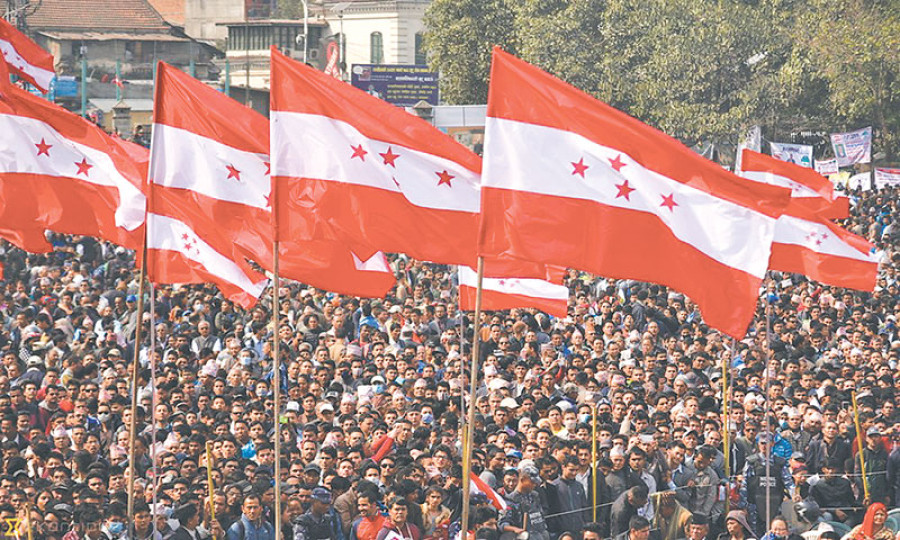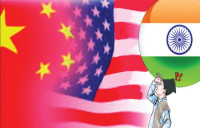Opinion
Congress conundrum
Though party leaders claim otherwise, the Nepali Congress’ electoral defeat was not mainly due to the formation of the left alliance
Asmita Verma
The Nepali Congress party held its election review meeting four months after the elections. Contrary to the ground assessments of many, and belief of its own cadres, Congress blamed the election debacle on the left alliance. This obviously didn’t go down well with people who are concerned about the future of the Nepali Congress (NC). Two questions that certainly need to be pondered upon are: What took NC so long to even hold a performance assessment meeting? And, was the formation of the left alliance really the major reason for NC’s loss?
The NC and its top leadership, especially president of the party and former Prime Minister Sher Bahadur Deuba, deserve credit for successfully holding the elections for the three tiers of federal government. Whether its leadership had anticipated the loss at the face of NC’s own coalition partner CPN (Maoist Centre) defecting to main opposition Communist Party of Nepal-United Marxist Leninist (CPN-UML) and NC’s weak structures at the local level, not holding a review meeting immediately after was baffling to the say the least. Internal blame and finger pointing continued for weeks after the announcement of the results. However, many party members consoled themselves because there was not a significant slide in the party’s share in the proportional system.
Congress’ humiliating defeat in the First-Past-The-Post (FPTP) system was due to both national developments and internal factors.
National dynamics
Congress’ partner in the last government CPN-MC cobbled an electoral alliance—the so-called left alliance—with CPN-UML. They also announced their intention to merge into one communist party post-election. These, and at the same time NC’s not being able to form a formidable ‘democratic’ counter-alliance were one aspect resulting in poor election results. Another was NC not taking a clear stand on the Indian economic blockade of 2015.
KP Sharma Oli’s ascendancy to the role of Prime Minister after the promulgation of the constitution and during the protests in the Tarai in 2015 earned him the reputation of being a ‘nationalist’ leader. Oli’s nationalist image was further elevated when he didn’t bow to Indian pressure even when a border blockade was imposed on Nepal. NC until then was not unpopular among the people. However, NC’s popularity dropped when it subsequently initiated a move to ally with CPN-MC to topple the Oli government in 2016. Even though CPN-MC’s Prachanda led the next government, NC was blamed for playing at India’s behest in toppling Oli.
But the formation of the left alliance just before the election dates were announced left NC shocked. By the time it could actually recuperate, contesting parties were already in the fray and election campaigns were in full swing. Congress made half-hearted efforts to gather support for a democratic alliance by courting Madhes-based parties and the Rastriya Prajatantra Party. But it never became a fully functional alliance that could effectively challenge the left alliance. At the same time, Oli continued his vocal criticism of India for its interference in Nepal’s internal affairs which earned him votes. Further, NC could not sufficiently appease its Madhes-based constituencies that it would indeed champion the demand for constitutional amendment.
Internal factors
NC has for a long time now been a party which has not been able to manage its internal conflicts. In the name of various factions there are too many power centres—and not just in the main party, but also in its sister organisations. It looks like a case of too many stakeholders within the party trying to influence the main leadership in their favour. This was particularly evident while allocating tickets for electoral candidates in the recently held elections. Thus, tickets were given to candidates who were hardly connected to the voter base but who were able to take the leaders of their own faction in confidence. The problem was further aggravated by the misallocation of election funds.
Even when the election process was under full sway, the party had not been able to organise and mobilise its structures at the local level. The local structure, if used better, could have campaigned vigorously in the party’s favour. The party’s top leadership, in their campaign speeches, made statements that showed less of their agenda and more of how ill-prepared they were for campaigning. The leaders claimed that NC was the party that has always championed the democratic cause, but their statements during the election did not carry the historical weight they proclaimed.
NC’s party structure in the local level is still functioning in an ad hoc manner. The fact that crucial offices in its central committee, such as the vice president and general secretaries, were nominated only after two and half years of the completion of its national convention displays that party lacks seriousness in addressing the nation’s issues. It is for now expected to play the role of a constructive opposition at the provincial as well as federal level. Unless NC is not able to renew its organizational will and project a collective strategy, it would continue to languish in the weight of its glorious past.
Verma is Central Committee Member of Nepal Students’ Union




 14.07°C Kathmandu
14.07°C Kathmandu










